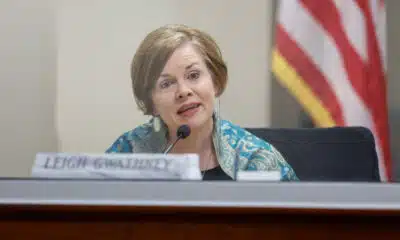News from the South - Arkansas News Feed
Arkansas religious rights bill augurs more than just a clarifying guide
Arkansas religious rights bill augurs more than just a clarifying guide
by Sonny Albarado, Arkansas Advocate
February 27, 2025
Sen. Alan Clark told his colleagues Tuesday he was initially skeptical about Senate Bill 223, which would “Create the Religious Rights at Public Schools Act.”
I too was skeptical. But unlike the Republican senator from Lonsdale, who ultimately voted for the bill, I remain skeptical.
The legislation would require public school districts and open charter schools to distribute at the beginning of each school year a copy of the act alerting students, parents and staff that they have “broad religious freedom” under the U.S. Constitution and First Amendment case law under the U.S. Supreme Court.
Among the rights the bill spells out are the ability to pray silently or out loud, individually or in groups and through other activities permitted to other groups by the school, including forming clubs. Also enumerated in the bill is the right to “display, print, recite or discuss religious texts and religious beliefs” when a student has the discretion to choose a topic or person of interest.
The bill further makes clear that students and staff can “give a Bible or other religious text to any other person at the school.”
Bill sponsor Sen. Mark Johnson, R-Ferndale, assured his fellow senators that the legislation merely serves as a guide “to clarify religious rights at public schools” and doesn’t introduce any new rights.
Republican Sen. Breanne Davis of Russellville echoed Johnson, saying the bill is “solidifying what’s already law.”
“Students, parents and staff want to know what their religious freedoms are. There are situations … where teachers are fired, students get in trouble, and it’s because people do not know where these things are in law. … Nobody knows what their rights are,” Davis said.
If people don’t know what their rights are, it could be because schools aren’t teaching civics. But I suspect what’s going on here is that certain religious sects want free rein to inject their particular brand of religion into public schools.
Despite the senators’ assurances that the bill is innocuous and not insidious, I remain concerned that if the bill becomes law, certain deeply religious people will use it to browbeat students and teachers into accepting their version of Christianity as the one true religion.
And like Democratic Sen. Stephanie Flowers of Pine Bluff, I see the bill as potentially disruptive to public education and public schools.
In speaking against the bill, Flowers delivered a disquisition on Article 14 and Amendment 53 of the Arkansas Constitution, which promise the state will “ever maintain a general, suitable and efficient system of free public schools.”
GET THE MORNING HEADLINES.
“It’s a bill that lends itself to indoctrinating young vulnerable, impressionable children,” she said. “When I talk about the possibility of indoctrination, I’m concerned about these documents of historical significance that are of a religious nature.”
She cited as an example a 1956 publication, Arkansas Faith, published by the White Citizens Council of Arkansas, noting that the subscription form declares subscribers to be white Christians who will oppose integration by any legal means necessary.
Flowers also said she didn’t think the bill was appropriate for public schools.
“It emboldens us to have religious rights outweigh and overpower our educational rights for our children.”
Johnson disagreed with Flowers, saying, “What we have here is a failure to communicate.” The bill “simply affirms existing religious rights. It’s not attacking anyone’s beliefs or establishing any beliefs.”
Republican Sen. Missy Irvin of Mountain View described herself as a deeply Christian person, but opposed the bill.
Irvin remembered being told by a fellow fifth-grader in her Catholic school that her parents weren’t going to heaven because “it’s easier for a camel to go through the eye of a needle than for a rich man to go to heaven.”
“That deeply offended me,” she said.
“Growing up Catholic, do you know how many times I was told I was going to hell because we were baptized as babies? From people that went to Baptist churches?” Irvin asked.
“I’m sorry but I just don’t think you bring people to Christ by beating them over the head with a Bible. I don’t think that’s right.”
She also described the bill as unnecessary: “You can do this already.” Her four children, who attend public schools, “pray all the time,” she said. “They carry Bibles in their backpacks. … This is not a problem, and it should not be in this law.”
While SB 223 carefully notes that “other religious texts” can be studied or read and shared in schools as well as the Bible, the language of the bill is clearly Christian-centric.
Johnson maintained that the legislation stays true to the First Amendment and is inclusive of all faiths.
“The First Amendment is messy,” Clark said. “We are a messy country. … Sometimes we don’t just disagree, we really disagree.
“I am very against the establishment of religion. [But] saying you can pray and this is what you will pray are two very different things.”
Clark is right about that, but SB 223 leaves too much room for someone in authority to tell students and teachers what they must pray.
YOU MAKE OUR WORK POSSIBLE.
Arkansas Advocate is part of States Newsroom, a nonprofit news network supported by grants and a coalition of donors as a 501c(3) public charity. Arkansas Advocate maintains editorial independence. Contact Editor Sonny Albarado for questions: info@arkansasadvocate.com.
The post Arkansas religious rights bill augurs more than just a clarifying guide appeared first on arkansasadvocate.com
News from the South - Arkansas News Feed
Arkansas Department of Education creates searchable child care provider database
by Tess Vrbin, Arkansas Advocate
July 8, 2025
The Arkansas Department of Education launched a searchable database Monday that allows parents to search for licensed child care providers throughout the state.
Childcare Arkansas includes a range of search options such as county, city, ZIP code and “Better Beginnings” quality ratings. The Arkansas Department of Human Services ranks child care quality on a scale of one to six.
The database also allows searches for specific criteria such as the ages of the children accepted at a facility, hours of operation, whether transportation is provided and whether the provider accepts school vouchers via the LEARNS Act. The search function includes an interactive map of results.
The LEARNS Act is a wide-ranging 2023 education law that includes several early childhood education provisions, among them the requirement for the new “parent-friendly” website. The law also requires “local lead” organizations throughout the state to assess local and regional access to pre-K and what gaps or barriers should be addressed. The Childcare Arkansas site includes a search function for local leads.
“Through the LEARNS Act, which created the Local Leads program, and tools like this website, we are empowering Arkansas families to make informed decisions and helping set our children on the path to success from early childhood on,” Gov. Sarah Huckabee Sanders said in Monday’s news release announcing Childcare Arkansas.
The website also allows parents to file complaints against child care facilities and search the School Readiness Assistant portal, which provides eligible families with “free or reduced childcare at approved state licensed providers, pending the availability of funds,” according to the portal’s website.
Arkansans face more challenges than most accessing child care, report shows
The LEARNS Act also moved the state’s Office of Early Childhood from the Department of Human Services to the Department of Education. The law “codified a commitment to improve access to quality childcare providers and streamlined education from cradle to career,” Secretary of Education Jacob Oliva said in Monday’s news release.
In 2023, child care for infants in Arkansas cost only 1.8% less than four-year public college tuition and 22.5% less than the average rent cost, according to a study released earlier this year by the Economic Policy Institute.
Arkansans have historically faced more challenges accessing quality child care than residents of other states, and Arkansas remains one of the worst states for child well-being overall, according to the Annie E. Casey Foundation.
GET THE MORNING HEADLINES.
Arkansas Advocate is part of States Newsroom, a nonprofit news network supported by grants and a coalition of donors as a 501c(3) public charity. Arkansas Advocate maintains editorial independence. Contact Editor Sonny Albarado for questions: info@arkansasadvocate.com.
The post Arkansas Department of Education creates searchable child care provider database appeared first on arkansasadvocate.com
Note: The following A.I. based commentary is not part of the original article, reproduced above, but is offered in the hopes that it will promote greater media literacy and critical thinking, by making any potential bias more visible to the reader –Staff Editor.
Political Bias Rating: Centrist
This article presents factual information about Arkansas’s new childcare database and related legislation without overt ideological framing. It includes government actions, official statements, and data on childcare costs and challenges, maintaining a neutral tone. While it highlights issues like childcare affordability and access, it does so through citing studies and official sources rather than advocating a particular political viewpoint. The coverage neither criticizes nor champions partisan policies, focusing instead on informing readers about practical developments in early childhood education within the state.
News from the South - Arkansas News Feed
The dangers of using a wire brush
SUMMARY: Using wire brushes to clean grills can be dangerous; tiny metal bristles can break off and become lodged in the body, causing serious injuries. Darby Bybee experienced severe stomach pain due to a wire bristle stuck in his small intestine, which required removal via a specialized camera. In another severe case, a bristle lodged in a man’s throat required removal of part of his esophagus. Testing a wire brush showed over 20 bristles left behind on a grill. Experts recommend alternatives like grill stones or replacing wire brushes every couple of years to avoid injury from these tiny, hard-to-see bristles.
40/29 News Subscribe to 40/29 on YouTube now for more: http://bit.ly/PTElbK Get more Northwest Arkansas news: …
News from the South - Arkansas News Feed
Local woman helping collect donations for recovery efforts
SUMMARY: Kate Krause, a University of Arkansas student and former camper at Camp Mystic, an all-girls Christian summer camp in Texas, is helping with recovery efforts after severe damage hit the camp. She describes Camp Mystic as a “slice of heaven” and a close-knit community, crediting owners Dick and Tweety for their kindness. The loss of Dick Eastland deeply affected her. Despite being nearly 700 miles away, Kate is raising funds—70% for Kerr County flood relief and 30% for Camp Mystic families—and organizing local business partnerships for fundraising to support those impacted. She has raised about \$450 so far.
Local woman helping collect donations for recovery efforts
Subscribe to 40/29 on YouTube now for more: http://bit.ly/PTElbK
Get more Northwest Arkansas news: http://www.4029tv.com
Like us: http://facebook.com/4029news
Follow us: http://twitter.com/4029news
Instagram: https://www.instagram.com/4029news/
-
News from the South - Louisiana News Feed7 days ago
Attorneys who run public defender offices replaced amid contract turmoil
-
News from the South - Alabama News Feed7 days ago
Gov. Kay Ivey expected to name Alabama parole board pick in coming days
-
News from the South - Arkansas News Feed4 days ago
Real-life Uncle Sam's descendants live in Arkansas
-
News from the South - Kentucky News Feed6 days ago
Man arrested after alleged strangulation of adult and juvenile
-
News from the South - Kentucky News Feed7 days ago
In small-town Kentucky, finding ‘all the more reason to resist’
-
News from the South - Missouri News Feed6 days ago
Bank robbery suspect arrested in suburban home neighbors say they warned about
-
Mississippi News Video6 days ago
MHP holiday travel enforcement period begins
-
News from the South - West Virginia News Feed5 days ago
Body found in Culvert identified












































